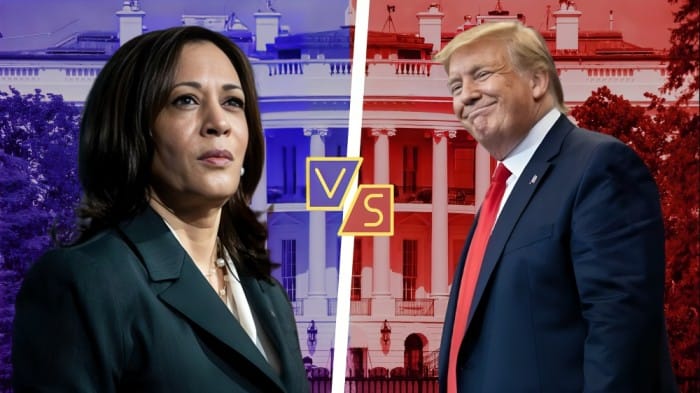The world is glued to the screens watching the U.S. presidential election 2024 as Americans head to the polls to decide between Kamala Harris and Donald Trump. After months of heated campaigning, today marks the culmination of their efforts as millions cast their votes eager to determine who will lead the nation. The outcome might take some time, especially in closely contested areas, as the votes are counted as soon as the polls close.

A Long Election Day Across Six-Time Zones
The United States spans six time zones, with polling stations opening as early as 6 am in each time zone and closing at 8 pm. Its real election day is rather long since most of the voting takes place within the four major time zones: Eastern, Central, Mountain, and Pacific time. Alaska is still on Alaska Standard Time and Hawaii on Hawaii-Aleutian Standard Time. This system means the results come in slowly. States on the East Coast report first, and those that are further west report as time passes, which feeds into the suspense.
A Global Election with a Highly Divisive Campaign
The U.S. elections have global implications because, on matters such as trade, climate change, or military relations, American decisions impact much of the globe. This season has been more disputational as the candidates have come out with powerful jibes, and personal attacks and have also faced extensive media attention which has been showered upon both of the nominees. This sort of atmosphere makes elections become grounds where rhetorical or inflammatory and controversial speeches and sometimes violent situations creep into the battlefield. This appears now more as an exception and not the norm anymore which used to be true about the scenario a few decades ago.
READ | Donald Trump or Kamala Harris? Americans Head to the Polls to Choose Their Next President
I must say that the amount of polarization and acrimony can help neither. Ideally, candidates should focus more on policies and values rather than aggressive rhetoric. However, this year’s campaign in so many ways depicts the tense and complex mood of the country. At some levels, it is pretty impossible to tell how much it affects the voters but with many people having reasons, either for or against either of the candidates it appears.
Polls Suggest a Close Race with Gender Differences
Polls reflect an extremely close race. Moreover, there are slight variations by gender.
The polls are recent, Kamala Harris leads the race against Trump by 1 percentage point, an indication that this race has been neck and neck. Gender also seems to matter; Kamala Harris was said to have a 12-point lead among women, and Trump a 7-point lead among men. It seems the voting demographics depend on how two candidates would differently place on issues of women’s rights, social issues, or immigration.
The most important reason for Harris’s supporters is her stance on protecting abortion rights. Most women and young voters fear the loss of some rights. For Trump’s fans, he vows to implement a more hardline immigration policy and attack the economic failures of the Biden-Harris administration as their reasons for supporting him. Many see Trump as the candidate who could “get America back on track,” as some might say, especially after years of high inflation and economic stress.
While Harris’s narrow lead is encouraging to her supporters, I think there’s a real sense of unpredictability here. One percentage point is barely anything in a race like this, and many voters may still be undecided. It’s going to come down to the final swing states, as we’ll see next.
Historical Implications
Whoever wins, it will be history. A win for Harris would make her the first female President of the United States and the first Black and Indian-American woman to ever occupy the position. This will be an incredible feat and a great source of inspiration for women and minorities around the world. Having already broken many barriers as the current Vice President, this would solidify her legacy even more.
Or if Trump prevails, he’ll make history of a somewhat odd kind himself: the first president in more than a century to serve two non-consecutive terms. That would fix him, good and bad, in American annals.
The Electoral College: Key States and Swing Voters
The U.S. election is won according to the electoral college mechanism with 538 electoral votes. It takes 270 electoral votes to win the presidency, so California, Texas, and Florida will be battleground states. However, it is these swing states or battleground states that may determine the winner because they are places that have changed hands between the Democratic and Republican parties in the past, such as Pennsylvania, Michigan, Georgia, and Arizona.
READ | U.S. Election 2024: Trump Takes Lead Over Harris in Crucial Swing States
Interestingly, over 80 million Americans voted before Election Day through either mail-in ballots or early in-person voting. Early voting has become very popular in the last few years. Therefore, predictions based on early results might not be as accurate since final counts often depend on same-day voters and decisions in these critical states that make it to the finish line.
The Battle for Congress
Not just a presidential election, of course, but control of Congress as well. This may be the Republicans’ year to gain several Senate seats, with Democrats looking vulnerable in a number of the traditionally conservative states, at least as far as incumbent senators are concerned. Meanwhile, the House remains one of the more unsettled and unpredictable of electoral outcomes.
Its outcome here will determine how much weight that next president can muster in lawmaking, to say nothing of what other policies will be initiated, or stopped. Gridlock could stretch into decades – something most Americans cannot look forward to.
In my opinion, whoever emerges as the president would need enormous support in Congress to have things going his way. Without such a thing, they may end up accomplishing little and disappointing many voters.
Conclusion
It could yet be one of the closest elections in memory, but whether it is Harris or Trump who succeeds, this election reflects an increasingly polarized society. Issues Americans care about are complicated, and race has shown how deeply divided the nation is across a range of key policies-from social policies to economic recovery.
Analysis by Atul Raj






